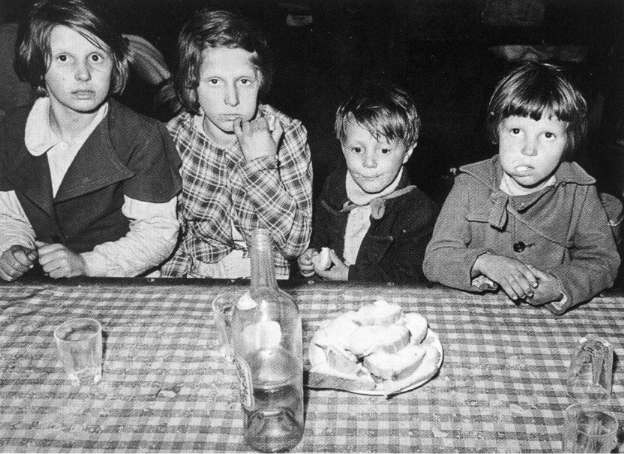An extract from Kaye Brookes’ memoir which describes her life in Paris and her eventual escape via Lisbon back to the US
The arrival of escaping refugees in Paris
… I should like to go back a few weeks earlier to the invasion of Holland and later Belgium, which brought into France, especially Paris, thousands of refugees. Day and night they poured into the City. The Paris radio immediately broadcast hourly an appeal to Parisians to give all aid to these unfortunate people. Everyone gave all possible help to them, food, clothing, lodging and money. These came in groups of five, ten or more families, friends or just a group of people who were passing in the same direction. These groups consisted of very old men, women and children of all ages, even some babies that were born by the roadside, and if their mothers survived, they too came along tenderly carrying their precious bundles in their arms. Those who were too old or too weak and did not survive, were buried along the roadside in nameless graves in trenches. This, it was told us, happened very often; many young children were among those who lost their nearest kin and were just marching along with a group. Many of these children were unable to tell you more than their first name; they could not even tell you the name of the village or town they came from.
Most of these refugees came with little clothing; they had worn their shoes and stockings off their feet, bare-footed, their feet bleeding and swollen, some very ill, and even a number wounded by bombs and in a most critical condition. All hospitals, schools, convents and provate homes offered an immediate refuge to these unfortunate people. Shelter, food and rest, warm clothing and medical aid were given by the French government and its people. It is wonderful how the French people turned out as one man, opening their homes, clothing, feeding and serving them with every act and deed of loving kindness; andneven among these refugees a great number of Nazi trained Fifth Columnists came in to prepare more of their subtle traitorous acts, at the same time partaking of all the hospitality they could get, and when this low-down cowardly act was discovered, it was most disheartening.
These refugees did not cease before the French refugees came pouring into into Paris from the north who had survived the German invadesr, and as the battle came southward so did the refugees. – these came in a much worse condition inasmuch as they were bombed out of their homes as well as along the roads by these monsters. This human mass of homeless people that passed before my very eyes is a tragic picture I can never forget. The sadness and cruelty of it was far worse than death. There are no words adequate to describe such a scene, so I can only make a few remarks about it. Groups of families, friends and strangers in small or large groups carrying their earthly belongings on every conceivable cart, wheel-barrow, baby carriage, bicycle or just anything that could be pulled or pushed, piled high with bedding, clothes, chickens, rabbits – just all that they could bring – babes in arms and little ones of three, four and five walking, sometimes being carried by an older sister or brother, very old men and women sick, on crutches and canes, and very often amidst this sad rabble of humans I saw a little boy leading a mongrel dog by a rope, his head and ears drooping and tail down as if he too sense the tragedy of it, or a little girl tenderly and tightly hugging a bewildered car in her arms – all silently trudging along, stupefied with frea, fatigue and terror of the roaring cannons constantly in their ears, never looking to right or left, heads down as if in silent prayer.
Here and there a little group of this enormous procession stopped to sit down on the curb, or some dear soul has passed out or passed on – at least his or her journey was ended. These French refugees asked for nothing, but were oh, so grateful for anything we offered them – a drink of water or milk for a small child, or a bar of chocolate and morsel of bread was thankfully received. These unfortunates had suffered beyond human endurance; their faces expressed such hopelessness, fear, terror, even to the children. Never did I hear a child cry or speak above a whisper; there seemed to e the stillness of death – something beyond description about these helpless , innocent people; they were speechless, demanding nothing, only to go ever onward if it was humanly possible.
See more from Kaye Brookes here
Comment on the story here.
